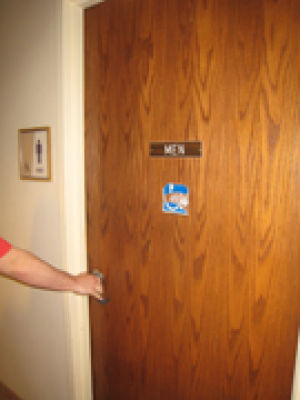Super Staph: Washburn campus experiences aggressive form of MRSA
February 25, 2008
An infection that’s resistant to the usual antibiotics and causes immense pain from a simple red swelling of the skin sounds like a plot in a Steven Spielberg movie.
However, it’s not.
Methicillin-resistant Staphylococcus aureus, or MRSA, is a bacterium resistant to normal antibiotics. It is spread primarily by skin-to-skin contact and is more real than a Spielberg plot.
“We’re definitely seeing probably one person a week with it, sometimes employees, sometimes nonemployees,” said Dr. Iris P. Gonzalez, director of student health services at Washburn. “But it’s around, it’s everywhere and we see people coming back with recurrent infections.”
The particular MRSA seen on campus is the community-associated kind, as opposed to the healthcare-associated kind found in facilities such as hospitals. Dr. Gonzalez said the community-associated MRSA has a much higher virulence factor, causing increased complications in addition to being resistant to normal antibiotics.
“These particular bacteria have developed virulence factors that allow them to create a more aggressive infection and a more painful and spreading kind of infection,” said Dr. Gonzalez.
According to the Centers for Disease Control and Prevention Web site, approximately .8 percent, or 2.3 million, of America’s population is colonized with MRSA. Dr. Gonzalez said the bacterium is benign in most people. But for those who do get it, MRSA begins as innocently as a small bug bite.
“Basically, it starts out looking like – people say classically a spider bite – and then it gets swollen and red and painful,” said Dr. Gonzalez. “You get this red lump at the skin level that is really pretty small but it hurts like crazy.”
If left untreated, Dr. Gonzalez said the red lump will increase in size and pain.
“We’ve seen some people with some pretty big infections that we’ve had to send to the surgeons to open,” said Dr. Gonzalez, “but we’ve opened a fair amount here. [MRSA] can do invasive infection and create the flesh-eating wounds. If it forms necrotizing fasciitis, if it gets to some of the deeper tissues, it can conceivably cause very rapidly spreading, aggressive infection.”
MRSA is treatable, but not necessarily quickly or easily.
“It’s hard to eradicate,” said Dr. Gonzalez. “It’s resistant to most of the normal antibiotics. You kind of have to go back to some of the older antibiotics and use them.”
The kind of skin-to-skin contact that passes MRSA is seen in gyms or anywhere people share facilities, Dr. Gonzalez said.
According to a study done on how long certain pathogens can live on hard surfaces, MRSA can “survive for months on a dry surface” if it is not cleaned with a disinfectant.
Joel Bluml, Student Recreation and Wellness Center director, understands the capacity for diseases to spread in a gym setting.
“That’s why you see our staff members cleaning, hopefully, all the time,” said Bluml. “Spraying down the equipment, wiping things off as soon as someone gets off a piece of cardio, keeping the floor clean and spraying down the stretching mats. The last thing we want to have happen is for someone to come into the SRWC to get healthy or stay healthy, and they get sick.”
Continuing with hopes of keeping the SRWC clean, Bluml said Susan Bjerke, assistant director of biology, will bring a microbiology class in this spring to test the SRWC’s cleanliness.
“I’m looking forward to the analysis by the microbiology class to see if we’re doing as good of a job as we think we are,” said Bluml. “If we can do something better, I want to find out how.”
Another place in which Dr. Gonzalez said MRSA can be contracted is restrooms. She said the rubbing someone’s posterior region takes each day from sitting can make the skin raw and open it up to the contraction of MRSA from a toilet seat if it has already been used by someone with MRSA.
She added that couples can also contract it from skin-on-skin contact.
Although Dr. Gonzalez says she has seen this kind of MRSA for a couple of years, she believes people are more aware of it and are taking better preventive measures, so students shouldn’t be too worried beyond basic hygiene. Keeping one’s skin intact is important for prevention as well. Even shaving can be dangerous.
“Shaving definitely opens up the skin to infections,” said Dr. Gonzalez. “It creates little nicks in the skin. So we see a lot of [infections] in women’s armpits and some in the bikini area on men and women.”
Skin can become dry and cracked particularly in winter months, making it easier to contract MRSA through the skin’s pores, said Dr. Gonzalez. Dry skin also tends to itch, which exacerbates the problem and can spread MRSA from its original place of infection.
She says it’s important to not take long, hot showers or use harsh soap, both of which will easily dry out skin. In addition to keeping skin moisturized it is important to frequently wash hands after using public facilities.
By following basic hygiene practices, MRSA can be controlled and prevented from spreading.



